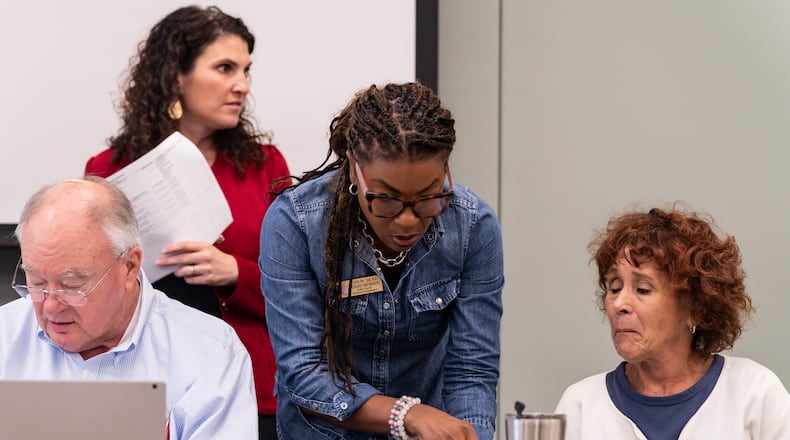County election boards across Georgia are urging the State Election Board to stop making new rules so close to November’s presidential race, even as the state board considers more changes later this week.
The Cobb County Board of Elections unanimously approved resolution Monday seeking a 90-day rule making a “quiet period” leading up to the election. The resolution signals election officials’ frustration with the State Election Board’s rulemaking efforts less than two months away from the presidential race.
“Given the proximity of the upcoming General Election, introducing new rules at this stage would create unnecessary confusion among both the public and the dedicated poll workers and election officials who are critical to ensuring a smooth and efficient voting process,” the resolution states.
Election officials across the state are concerned that recent rules approved by the Republican-controlled State Election Board requiring an undefined “reasonable inquiry” and add requirements before county boards finalize results could cause delays in election certification.
Last month, Muscogee County’s election board unanimously passed a quiet period resolution and at least six other counties, including Gwinnett and Forsyth, have discussed adopting similar policies.
The Republican National Committee and supporters of recent election rule changes say the state board’s actions will uphold the security and accuracy of elections. Meanwhile, Georgia Secretary of State Brad Raffensperger and election officials have criticized these last-minute rulemaking efforts, saying they could create chaos.
“There is going to be some counties that inadvertently do not follow the rules only because of a lack of knowledge of the rules,” said Travis Doss, elections director in Richmond County and president of the Georgia Association of Voter Registration and Election Officials.
Some county boards have yet to receive guidance on recent rule changes, such as what constitutes a “reasonable inquiry,” Doss said.
“That’s where I feel there could be a lot of confusion and misinformation, because a lot of counties do not know what has passed, what has been proposed, what has been denied and what is upcoming,” Doss said.
In Richmond County, poll workers are being trained in advance to count ballots by hand in case the State Election Board approves a rule Friday mandating hand-counting the day after the election to ensure totals match numbers tabulated by voting machines.
But it’s not just about confusion among election officials.
“What are voters who are watching the election night returns going to be thinking when a large batch of ballots comes in by 8 (p.m.) but then you hear nothing for the next two hours?” Doss said. “There is going to be confusion.”
In the wake of the 2020 election, where former President Donald Trump made baseless claims of a rigged election, Republican state lawmakers have passed a series of “election integrity” laws, despite multiple recounts and investigations debunking allegations of widespread fraud.
“Our focus is running a smooth election as accurately as possible and introducing any new rules this late in the game adds risk to that process,” Cobb elections board member Stacy Efrat, a Democrat, said days before the State Election Board considers more rule changes Friday.
Earlier in the Cobb elections Monday meeting, board member Jennifer Mosbacher addressed an audience member’s “heil Hitler” remark that caused a meeting last week to abruptly stop.
“Not only was the individual unable to accept responsibility, own up to the hateful speech and exit, but a room full of people sat in complicit silence,” Mosbacher said. “A silence that frightens me. A silence that screams we have forgotten the depths of violence and human atrocities where hate speech can lead.”
About the Author
Keep Reading
The Latest
Featured




